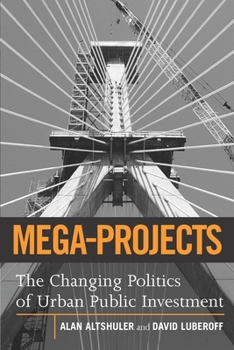Mega-Projects: The Changing Politics of Urban Public Investment
Select Format
Select Condition 
Book Overview
"A Brookings Institution Press and Lincoln Institute of Land Policy publication Since the demise of urban renewal in the early 1970s, the politics of large-scale public investment in and around major American cities has received little scholarly attention. In Mega-Projects, Alan Altshuler and David Luberoff analyze the unprecedented wave of large-scale (mega-) public investments that occurred in American cities during the 1950s and 1960s; the social upheavals they triggered, which derailed large numbers of projects during the late 1960s and early 1970s; and the political impulses that have shaped a new generation of urban mega-projects in the decades since. They also appraise the most important consequences of policy shifts over this half-century and draw out common themes from the rich variety of programmatic and project developments that they chronicle. The authors integrate narratives of national as well as state and local policymaking, and of mobilization by (mainly local) project advocates, with a profound examination of how well leading theories of urban politics explain the observed realities. The specific cases they analyze include a wide mix of transportation and downtown revitalization projects, drawn from numerous regions--most notably Boston, Denver, Los Angeles, New York City, Chicago, Atlanta, Dallas, Portland, and Seattle. While their original research focuses on highway, airport, and rail transit programs and projects, they draw as well on the work of others to analyze the politics of public investment in urban renewal, downtown retailing, convention centers, and professional sports facilities. In comparing their findings with leading theories of urban and American politics, Altshuler and Luberoff arrive at some surprising findings about which perform best and also reveal some important gaps in the literature as a whole. In a concluding chapter, they examine the potential effects of new fiscal pressures, business mobilization to relax environmental constraints, and security concerns in the wake of September 11. And they make clear their own views about how best to achieve a balance between developmental, environmental, and democratic values in public investment decisionmaking. Integrating fifty years of urban development history with leading theories of urban and American politics, Mega-Projects provides significant new insights into urban and intergovernmental politics.
"
"
Format:Paperback
Language:English
ISBN:0815701292
ISBN13:9780815701293
Release Date:April 2003
Publisher:Globe Pequot Publishing Group Inc/Bloomsbury
Length:339 Pages
Weight:1.18 lbs.
Dimensions:0.8" x 6.4" x 9.0"
Customer Reviews
1 rating
In-depth analysis of urban rojects and their prospects for the future
Published by Thriftbooks.com User , 16 years ago
Altschuler and Luberoff provide an in-depth analysis of urban mega-projects focusing on three major categories: highways, airports, and rail transit. They preface their treatment a first-rate discussion and analysis of the theoretical framework and evolving political context in which urban mega-projects are undertaken. In this sense, the book is invaluable for those persons in the project management sector who need to be able to deal with the politics of their own projects (despite the ongoing belief among students that politics are irrelevant to project success). The real driver of these projects is the demand for economic growth and prosperity by important political constituencies, particularly the business communities of these various cities, but also other groups (including neighborhoods and other local institutions) that are interested in promoting prosperity as well. The discussion here is balanced, thoughtful, informed and astute. The authors detail the era of carte-blanche and laissez-faire mega projects which lasted into the late 1960s, only to be confronted with resistance to groups (such as neighborhoods and environmentalists) that had heretofore been shut own, silenced, or overlooked. They treat the seventies, eighties and nineties as a time of retrenchment, and see the present era as one in which mega-projects will continue to drive forward in specific areas, but in which they will also be far more limited in scope than in the preceding years. They note the constraining force of the "do no harm" doctrine, and detail how this doctrine--promulgated as a consequence of the excesses of the mega-projects of the sixties, when neighborhood and environmental impacts were hardly ever considered (e.g., the ill-fated Jones Falls Expressway in Baltimore, which the book does not mention)--is being implemented in projects such as the Federal government's reconstruction and expansion of the Woodrow Wilson Bridge on Washington DC's southern edge. The book ends with an analysis of the long-term impact of the legal retrenchment against mega-projects that occurred during the sixties, and its authors, while sympathetic with the democratic political tendencies generated by the opposition to these projecs, concludes that legitimate objections can still stop projects. Simple use of delaying tactics will not work, and projects will advance against such opposition, though far more slowly and with greatly increased costs. Their discussion of regime politics is especially important, and provides and essential caveat for any serious professional or activist seeking to halt a politically advanced, though publicly deleterious project.





